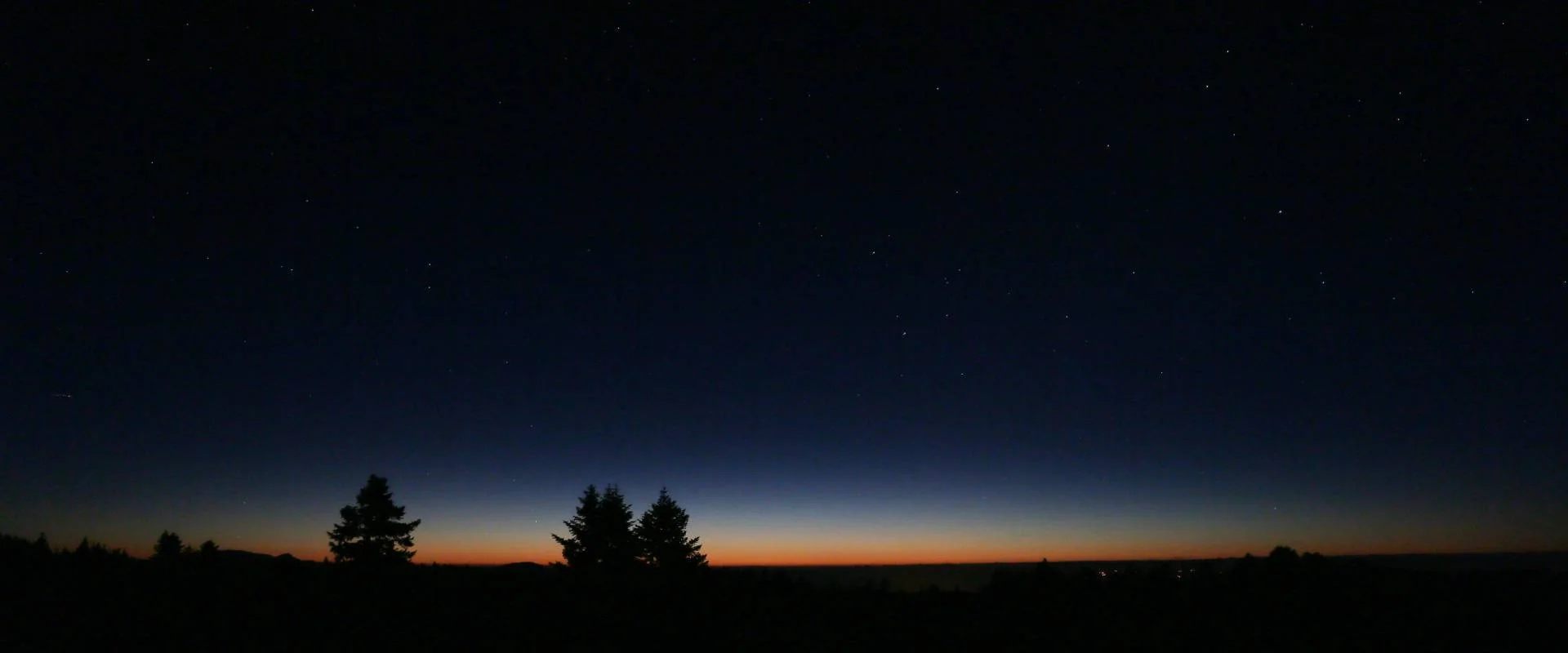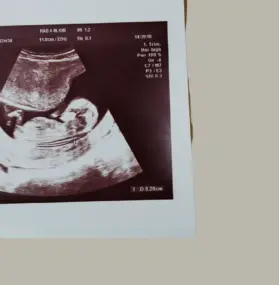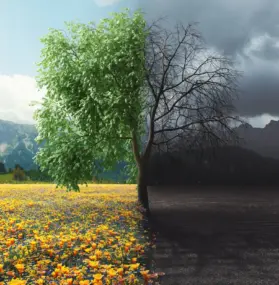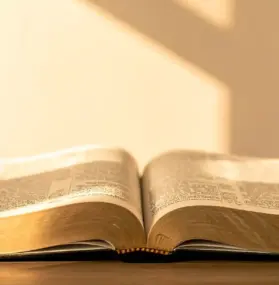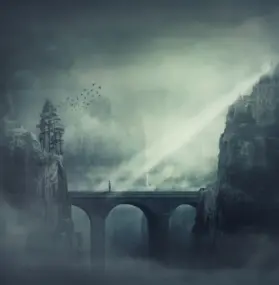- by Carrie Shaw
- on September 9, 2025
There was a time, not so long ago, when my world was very dark. Have you ever stood outside, on a moonless night, with the thick, velvety air pressed all around you and the inky black sky above, and realised that you could see precisely nothing? That’s the kind of dark I mean.
Of course, I had all the feels as well; sadness, disorientation, confusion, an underlying sense of panic, but, primarily, the overwhelming sense was one of complete obscurity. I couldn’t see through the impenetrable blackness all around me, I couldn’t even see my hand in front of my face.
I had never been in a place like that before. It wasn’t until a long time afterward that I was able to be thankful for such a darkness, but right in the middle, I longed for light, for the path to be made clear, for God to give me a sign.
GIDEON’S FLEECE
A story kept coming to me during this time – one about a man named Gideon from the Old Testament, whom God raised up as a mighty hero and rescuer of Israel (Judges 6-8). The Israelites had been harried for seven long years under the hand of the Midianites (who were related to Israel through their common ancestor, Abraham).
The angel of the Lord appeared to Gideon one day while he was secretly threshing wheat, so as to hide the grain from the marauding Midianites.
The angel told Gideon, “Go with the strength you have, and rescue Israel from the Midianites. I am sending you.”
Gideon wasn’t so sure. It wasn’t so much that he doubted God, but rather he doubted God would use him. He wanted proof.
He asked God for a sign. He would put a woollen fleece out overnight on the threshing floor and if the fleece was wet with dew in the morning and the ground around it was dry, he would know for sure that God was with him and would help him rescue Israel.
The following morning, Gideon awoke to find a wet fleece on a dry floor. In fact, it was so wet that he was able to wring it out into a bowl, filling it to the brim. Convincing, yes?
Not quite enough for Gideon. Maybe it wasn’t God’s doing, just some strange quirk of overnight temperatures and precipitation and such.
He asked for a second sign, imploring God not to lose patience with him. He would put the fleece out again, but this time he asked that the fleece be dry in the morning while the ground all around would be wet.
Amazingly, that’s exactly what happened. And that’s where the story also ends, at least in relation to the signs.
Gideon does go on to march against the Midianites, winning a decisive battle and freeing the Israelites from their control. The book of Judges, which chronicles these events, tells us that the Midianites never recovered from that day onward. The people of Israel were so impressed with Gideon’s bravery and leadership, that they tried to make him king, but he refused,
We’re told nothing, however, about Gideon’s thoughts or feelings after receiving the second sign, only that he went confidently into battle soon after, clearly believing God to be with him.
I had always taken this story to mean: ‘ask God for a sign and the way will be made clear.’ And so, as I entered my dark night of the soul (although I didn’t know that’s what it was at the time), I repeatedly asked God for a sign. Not so specifically as, ‘make this or that happen’, but more like ‘show me which way to go.’ Metaphorically speaking, I was laying out my fleece each night, looking for a change; either a wet fleece and dry ground, or a dry fleece and wet ground. I didn’t much mind which one it was, I just wanted some indication of God’s presence, showing me which direction to take.
Like Gideon, I wanted to be brave but I didn’t want to make a decision without knowing for sure that God was with me in it.
Bafflingly, it felt like God remained silent. I couldn’t understand it, I felt like I desperately needed a sign, I was actively looking for a sign – and yet my world remained dark.
THE SIGN WAS THE SIGN
I kept wondering about the story of Gideon and the message I thought the story communicated – ask God to show you, and then go that way – yet I couldn’t understand why God wasn’t coming through for me.
And then, suddenly, it hit me. The sign was the sign.
The story of Gideon wasn’t so much about direction but about trust. God already knew the way and could see the future mapped out, even if Gideon couldn’t. And Gideon didn’t need to be able to see that future to trust that God was already in it and that He had already gone before him. He just had to believe.
God had proven to Gideon He was able to do both things in relation to the fleece, and that, in fact, nothing was impossible with God.
This was the God who had led the Israelites out of Egypt and through the Red Sea on dry ground. This was the God who had spoken to Moses from the depths of a burning bush which had not been consumed. This was the God who had called faithful Abraham out of the wealthy and prosperous civilisation of Ur to come to a place that only God knew, to a place that would become his home.
The sign was the sign – God can do anything. He already had my future mapped out, I just had to trust Him with it and step out.
I needed to make a decision.
STEPPING OUT IN FAITH
I’d like to be able to say that I then stepped out boldly and unafraid into a darkness that seemed all-encompassing. In reality, however, the fact that I couldn’t see where I was about to place my first step was terrifying.
Although deeply unhappy with where I was, I was also really scared to leave the place of no-decision. At least it was safe. At least it was known. At least I didn’t have to wrestle with all the doubts and fears that come when trying to make a decision – will it be the right one, will my family be ok, what if this changes everything…?
I was really scared to say ‘yes’ to God, without a single clue as to where He would take me. But I finally understood that the lesson of the story of Gideon wasn’t about waiting for the perfect sign before stepping out, but rather stepping out in faith, believing God had gone before me—and then watching God go to work.
They say that courage isn’t the absence of fear, but feeling the fear and doing it anyway (although the definition of stupidity is much the same which is why life can get complicated at times).
I noticed, almost immediately the moment I stepped out, a small glimmer of light. Things shifted in my world, doors began opening, new relationships began to flourish, and the darkness began to edge away. Like someone who has been deep underground, I felt my eyes adjusting to the light, my skin soaking in the warmth of the sun.
“Sometimes when we’re in a really dark place, it can feel like we’ve been buried, but we’ve actually been planted.” – Christine Caine
I discovered that what had felt like a sentence of death was really a season of dormancy. I was like a seed, waiting for the right kind of conditions to grow. And, strangely enough, the truth is that most seeds germinate best in dark conditions.
The darkness wasn’t an unhappy accident of fate, but a determined season of God. Things needed to die in the darkness in order to be reborn again in the light.
THE DARK NIGHT OF THE SOUL
Even now, still thinking about that time, I become still and quiet, deep within my soul. It’s a difficult period to contemplate, a time of profound pain for me.
The dark night of the soul is, as Inayat Khan writes, a total annihilation of all that you had believed in and thought that you were. Yet as Joseph Campbell states, “the dark night of the soul comes just before revelation. When everything is lost, and all seems darkness, then comes the new life and all that is needed.“
I’ve recently been reading ‘Confronting Christianity’ by Rebecca McLaughlin, who tackles the topic of suffering in Chapter 11 of her book. This chapter perhaps wouldn’t have resonated with me back then as it does now; I would venture to say that I had, generally speaking, suffered very little in my life up until that point.
Rebecca offers a biblical framework around our concept and experience of suffering, sharing the story of two sisters, Mary and Martha, whose brother Lazarus had died (John 11:1-26). When Jesus finally arrives at their house, Lazarus has been dead for four days and both sisters are grief-stricken. We wonder that Jesus, who could have come sooner, didn’t, and instead chose to stay away. Yet even when Jesus does come, he does not fix Martha’s problem but instead invites her into a deeper, more profound realisation…
“Jesus looks her [Martha] in the eye and says, “I am the resurrection and the life.” As you stand here in your desperate grief, your greatest need is not to have your brother back again. It’s to have me.
This statement is yet more shocking than Jesus’ failure to come in the first place. Far from being the “good moral teacher who never claimed to be God” of modern mythology, Jesus here claims not that he is offering good guidelines for life, but that he himself is life: life in the face of suffering, life in the face of death.
Jesus’ power over death is absolute. I believe it is the only hope we have in the face of our inevitable end. But what fascinates me about this story is how little focus there is on Lazarus himself. Rather, the narrative draws our gaze to profound questions…In this strange stretching of the story, we get a glimpse of the whole biblical framework for suffering. The space between Lazarus’ death and Jesus’ calling of him out of the tomb is the space in which Martha sees Jesus for who he really is: her very life.” | Rebecca McLaughlin, Confronting Christianity, pages 199-202
OUT THE OTHER SIDE
The dark night of the soul is the place where we confront the reality of death, natural or spiritual, perhaps for the first time. It’s the collapse of everything we thought we knew and understood, a painful shedding of possibly our identity, relationships, career, habits, or belief systems that had allowed us to construct some meaning to our lives.
It is often a time of existential crisis as we wrestle with our identity, our sense of self, and the purpose and meaning of life.
Yet it’s also the place where we confront Life, the true Life of the world, maybe, too, truly for the first time. “Our suffering is an entry point to relationship, a relationship formed through suffering as much as through joy. If, as Jesus claims, the goal of our existence is relationship with him, finding him in our suffering is the point.” (Rebecca McLaughlin)
As C S Lewis, British writer, literary scholar, and Anglician lay theologian, who experienced overwhelming grief at the loss of his wife, commented, “Pain insists upon being attended to. God whispers to us in our pleasures, speaks in our consciences, but shouts in our pain. It is His megaphone to rouse a deaf world.”
I wasn’t necessarily a better Christian walking out the other side of that dark tunnel. I wasn’t necessarily wiser, braver, or more certain of my next steps. The pain I experienced didn’t suddenly evaporate like mist in the bright light of day, and I wasn’t instantly fixed.
And yet, somehow, I had changed. When I emerged, finally, I did so with a deeper recognition of where I needed to be putting my trust, a better understanding of what is truly of value, and a resolution to allow the painful experience to shape me into a better person moving forward.
And I can still recall the moment in the middle of that dark night of the soul when I suddenly understood the call of God to mean that I must step forward into the darkness. And that, as I took that first step, light began to spill in through the darkness, illuminating my path, and I discovered that the One I was following had been there all along.
